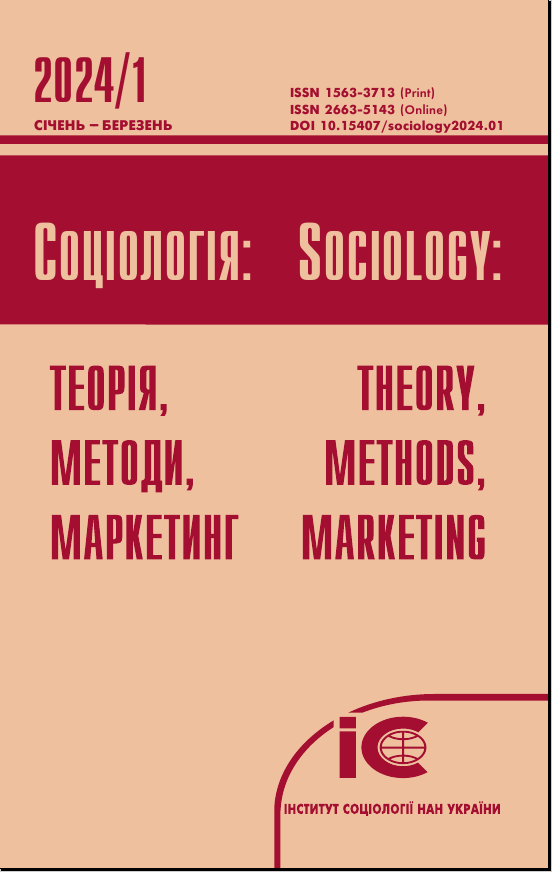SOCIETY AFTER PANDEMIC: UKRAINE AND THE WORLD. THE 14TH ANNUAL CONFERENCE (INTERNATIONAL SOCIOLOGICAL READINGS) IN MEMORY OF NATALIA PANINA
stmm. 2021 (1): 172-183
DOI https://doi.org/10.15407/sociology2021.01.172
OL’HA MAKSYMENKO, MA in Psychology, leading sociologist at the Department of Methodology and Methods of Sociology, Institute of Sociology, National Academy of Sciences of Ukraine (12 Shovkovychna St., Kyiv, 01021)
olga.maksimenko.65@gmail.com
https://orcid.org/0000-0003-2804-2790
How much has the world around us changed for the past year? What kinds of societal shifts have occurred in some spheres such as sociological research, secondary and higher education, management, journalism, interpersonal communication or social work? What other kinds of transformation is society likely to undergo in the near future? These were the questions that both participants in and guests of the 14th annual conference in memory of Natalia Panina (1949–2006) sought to answer. The conference, also known as the International Sociological Readings, took place on 10 December 2020 and was hosted by the Institute of Sociology of the National Academy of Sciences of Ukraine. Structurally, the event consisted of two parts: a plenary session and a round-table discussion. At the plenary session, four speeches were delivered: “Survey techniques during the pandemic” (V. Paniotto), “Social inequality and extraordinary events” (S. Makeev and N. Kovalisko), “Higher education in times of and post-COVID-19” (V. Bakirov and M. Aharkov), “COVID-19: New daily routines of Ukrainian teachers, students and parents” (O. Maksymenko). The round-table discussion titled “Society and pandemic” was open to everyone interested. They could join the discussion via Google Meet. The Readings ended with the presentation of a book “Separate sociological approximations” authored by Serhii Makeev.
Keywords: Natalia Panina, Ukrainian society, globalisation, COVID-19, a post-pandemic world
SOCIETY AFTER PANDEMIC: UKRAINE AND THE WORLD. THE 14TH ANNUAL CONFERENCE (INTERNATIONAL SOCIOLOGICAL READINGS) IN MEMORY OF NATALIA PANINA
stmm. 2021 (1): 172-183
DOI https://doi.org/10.15407/sociology2021.01.172
OL’HA MAKSYMENKO, MA in Psychology, leading sociologist at the Department of Methodology and Methods of Sociology, Institute of Sociology, National Academy of Sciences of Ukraine (12 Shovkovychna St., Kyiv, 01021)
olga.maksimenko.65@gmail.com
https://orcid.org/0000-0003-2804-2790
How much has the world around us changed for the past year? What kinds of societal shifts have occurred in some spheres such as sociological research, secondary and higher education, management, journalism, interpersonal communication or social work? What other kinds of transformation is society likely to undergo in the near future? These were the questions that both participants in and guests of the 14th annual conference in memory of Natalia Panina (1949–2006) sought to answer. The conference, also known as the International Sociological Readings, took place on 10 December 2020 and was hosted by the Institute of Sociology of the National Academy of Sciences of Ukraine. Structurally, the event consisted of two parts: a plenary session and a round-table discussion. At the plenary session, four speeches were delivered: “Survey techniques during the pandemic” (V. Paniotto), “Social inequality and extraordinary events” (S. Makeev and N. Kovalisko), “Higher education in times of and post-COVID-19” (V. Bakirov and M. Aharkov), “COVID-19: New daily routines of Ukrainian teachers, students and parents” (O. Maksymenko). The round-table discussion titled “Society and pandemic” was open to everyone interested. They could join the discussion via Google Meet. The Readings ended with the presentation of a book “Separate sociological approximations” authored by Serhii Makeev.
Keywords: Natalia Panina, Ukrainian society, globalisation, COVID-19, a post-pandemic world
